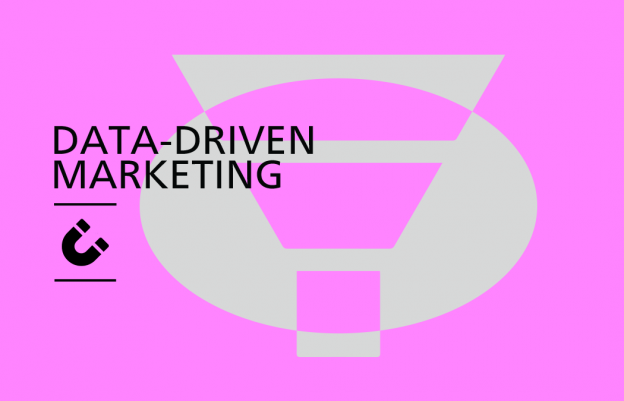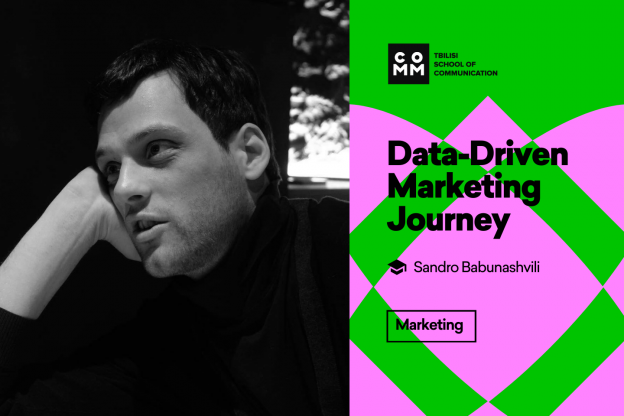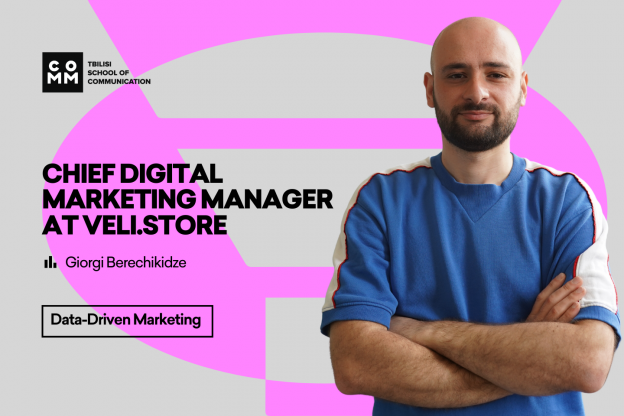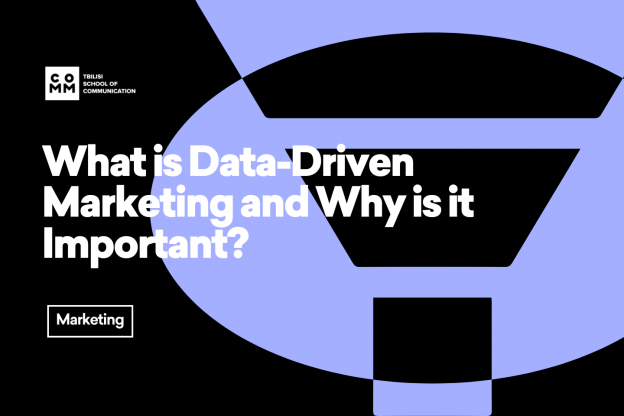
In the digital space, every user behavior is data, and the ability to use it correctly is the main means of gaining an advantage over competitors, as it helps us make smart decisions based on facts rather than assumptions.
Unlike traditional marketing approaches, data-driven marketing helps you better understand your customers, study their behaviors, communicate with them in a relevant way, determine where and how to "meet" them based on their needs, and measure the effectiveness of marketing activities.
Throughout the course, we will go through data analytics, customer segmentation, attribution modeling, developing marketing action plans and budgets, evaluating strategies and tactics, and more in detail.
კურსის დასრულების შემდეგ შეგეძლება
დამატებითი უნარები: ROI, Meta, Google ads, Display 360.
-
Interpret data to draw correct conclusions;
-
Use data in developing marketing strategies and tactics;
-
Optimize budgets and conduct marketing processes more efficiently;
-
Personalize marketing communication and select effective communication channels;
-
Measure and optimize ROI of marketing campaigns;
-
Observe and analyze competitors;
-
Use various data processing tools for better visualization;
-
Effectively communicate and collaborate with analysts, developers, and other organizational teams to better achieve marketing goals.
ვისთვის არის კურსი

Marketers
The course is designed for marketers or people with education in marketing who have basic knowledge in digital marketing; for marketing consultants who want to expand their skills and offer data-driven marketing services to clients.

Marketing Executives
For marketing executives who want to use data to make better decisions and grow their business; also for founders or executive managers who want to grow their own business very quickly and efficiently using digital channels.

For Digital, Social Media, and Content Marketers
For digital, social media, and content marketers who want to optimize content and campaigns; for e-commerce managers for whom increasing sales through effective marketing is important.
პროგრამა მოიცავს
Alumni Club
After successfully completing the final exam, graduates will be automatically enrolled in the Alumni Club. This membership grants them access to exclusive events, content, and special offers from our partner companies
Work Based Learning
The course includes practice-based learning, including assignments/exercises and individual projects.
Bilingual Certification
Upon successful completion of the course, students will receive a bilingual certificate.
კურსდამთავრებულები
სილაბუსი
აარჩიე შენთვის სასურველი დრო
ლექტორები
გიორგი ბერეჩიკიძე
Data Driven Marketing
გიორგი ბერეჩიკიძე
Data Driven Marketing
გიორგის 10 წლიანი გამოცდილება აქვს ციფრულ მარკეტინგში, ციფრულ ანალიტიკასა და ციფრული პროექტების მართვაში, ბოლო რამდენიმე წელი აღმასრულებელ პოზიციებზე. მას უმუშავია ციფრული პროდუქტების, ორგანიზაციული დიჯიტალიზაციის და ციფრული მარკეტინგის კონსულტანტად და ტრენერად სხვადასხვა საერთაშორისო ორგანიზაციის პროექტებში, როგორიცაა UNDP BIOFIN, PMCG, EBRD, USAID Zrda activity in Georgia. 2021 წლიდან გიორგი შეუერთდა ქართული e-commerce სტარტაპის, VELI.store-ის გუნდს, როგორც ციფრული მარკეტინგის ხელმძღვანელი და აქტიურად არის ჩართული კომპანიის ზრდისთვის საჭირო უმნიშვნელოვანეს პროცესებში.
 Linkedin
Linkedin
ხშირად დასმული კითხვები კურსის შესახებ
Your search Digital Designer did not match any documents
ვერ მიიღე შენთვის საინტერესო ინფორმაცია?
ჩაეწერე უფასო კონსულტაციაზეშესაძლოა გაინტერესებდეს
რელევანტური რესურსები
იხილე სრულადData-Driven Marketing Journey: How Sandro Acquired New Skills and Experience
In the modern world, the most valuable material for developing successful marketing campaigns is the data received from consumers themselves. Unlike traditional marketing, Data-Driven marketing is based on facts rather than assumptions. Analyzing consumer behavior helps marketers make informed decisions - they can correctly identify the target audience and develop appropriate strategies for them. If you're interested in how to make the best marketing decisions, read this blog. Sandro Babunashvili, a Data-Driven Marketing course graduate, will share his experience with you. Sandro is the head of the digital marketing team at Tsur Group. His main activity is developing and implementing digital marketing strategies. Daily tasks and responsibilities include data analysis, content creation, social media management, SEO optimization, and increasing customer engagement to develop 7 brands within the holding. "Recognizing and analyzing the value of data in the modern marketing field is an important aspect. It was precisely because of such aspects that I became interested in Data-Driven marketing." He decided to take the course specifically to improve his data analysis and interpretation skills. According to Sandro, the learning process at Commschool was exceptionally interesting and informative. The lecturer's sharing of personal experience and the latest trends proved to be a particularly valuable and unique experience. Data-Driven Marketing - About the Course As Sandro notes, the course exceeded his expectations. Within the program, he was able to enrich his theoretical knowledge and develop practical skills. During the course, he acquired skills in data analysis, marketing strategy development, and effective evaluation of results. He also further improved his communication, analytical thinking, and problem-solving skills. Data-Driven Marketing 14 Lecture | 42 Hour | 7 Week Learn More "The most valuable part was the practical assignments related to data analysis, which strengthened my ability to draw important conclusions using real data." After completing the Data-Driven Marketing course, you'll be able to correctly analyze data and use it when developing marketing strategies. You'll also acquire skills in budget optimization and more effective management of marketing processes. With the help of practical exercises, you'll also improve soft skills, which are equally necessary for professional success in this field. Final Project The final project is one of the most interesting parts of Commschool's courses. Within its framework, Sandro worked on Pea.nut Store. This company is his family's startup, and its marketing and financial analytics side is entirely entrusted to Sandro. Pea.nut Store produces Georgian peanut and almond butter. In the process of developing this project, he had accumulated a large base of theoretical and statistical information, which he considered the most interesting material for building the final project. In the process of creating the presentation, the tools and practical knowledge he acquired and improved during the course were quite useful. "As a result of the acquired knowledge, I will be able to use analytical tools even more effectively to produce targeted and profitable marketing campaigns." Sandro is already successfully using the acquired knowledge and experience in several marketing campaigns. As a result, he further improved the quality of advertisements and, most importantly, took data processing to a completely new level.For those interested in the Data-Driven approach and learning about it, Sandro advises you to always be curious and never stop learning. This direction constantly requires acquiring new skills and mastering technologies. For this, he shares Sandro's recommendations:Podcasts:Marketing Over CoffeeThe Data Skeptic PodcastBlogs: Neil Patel's BlogHubSpot Blog So, if you want to learn more about the process of developing modern marketing strategies, this course is for you. Familiarize yourself with the program syllabus in detail and join us at Commschool! Learn More
Meet the Data-Driven Marketing Lecturer, Giorgi Berechikidze
In the digital space, any consumer behavior is data, and the ability to use it correctly is the main means of gaining an advantage over competitors. It helps us make smart decisions based on facts, not assumptions. Through segmentation, personalization of consumer experience, and real-time strategy improvement, the Data-Driven approach is the modern marketing way to achieve more sales and better relationships with consumers. If you want to know digital marketing at a professional level, you've come to the right place. In this blog, I'll introduce you to the Data-Driven Marketing lecturer - Giorgi Berechikidze, who shares his many years of experience and the advantages of the field. Giorgi has 10 years of experience in digital marketing, digital analytics, and digital project management, with the last few years in executive positions. He has worked as a consultant and trainer for digital products, organizational digitalization, and digital marketing in various international organization projects, such as UNDP BIOFIN, PMCG, EBRD, USAID Zrda activity in Georgia. "For an analyst by education, my first professional intersection with marketing was working as a marketing analyst. There I realized how seemingly dry and unproductive data could turn into a very powerful tool and be the foundation for implementing proper, result-oriented campaigns." Since 2021, Giorgi has joined the team of the Georgian e-commerce startup, VELI.store, as the head of digital marketing and is actively involved in the most important processes necessary for the company's growth. "It became clear that what I do is very productive and beneficial for the organization and for me as a professional in this field. All this gave me the opportunity to share this knowledge and help marketers to properly develop the company and its growth at the expense of efficiency." Data-Driven Marketing Program 14 lectures | 42 hours | 7 weeks Learn more Important skills for a Data-Driven marketer: Giorgi shares important skills for data-driven marketing:Knowledge of digital marketing functioning;Use of digital tools;Data processing, analysis, and insight extraction;Technical knowledge;Working with marketing automation or data visualization tools; With the knowledge of these skills and techniques, there are many career prospects, as data-driven marketing is the job and position of the future. After self-development in this direction, you can become a digital marketing executive manager, marketing analyst, marketing executive manager, especially in organizations where marketing plays a leading role in company growth. "For studying data-driven marketing, at least a basic knowledge of front-end (HTML, CSS, JavaScript) is needed to write events in Google Tag Manager, but it's a big advantage if the marketer also knows data processing languages such as Python or SQL." https://www.youtube.com/watch?v=pTEwzK1UrhMRegarding the course, Giorgi's main goal is to show students how they can use data to make the right decisions. He will try to do this through interactive case studies and exercises, where students will learn data-driven marketing strategies and ways to implement activities."In Data Driven Marketing, you will be armed with a dataset that is ready to support each argument you are trying to prove, which is the basis for a solid marketing strategy. Customer segmentation, attribution modeling, marketing action plan and budget development, strategy and tactics evaluation learned during the course will allow you to connect with your ideal target group at the right time, with the right offer that matches their exact desires and needs."Each topic that you can cover during the course will be divided into three components: The essence, relevance, and necessity of the issue.Specific success or failure cases, analyzing what happened and studying the process.Transferring the acquired knowledge to an assignment, which will mostly be on a company or organization of your choice. See syllabus Recommendations: GrowthHackers Community – a very good, technical, content-rich platform for growth. Neil Patel is a very interesting performance marketer, his podcast on Spotify (Marketing School – Digital Marketing and Online Marketing Tips) has easily digestible 5-10 minute episodes, covering many digital marketing topics, so you'll definitely find something interesting for you.Measure What Matters – a very good book on how you can not only achieve but even exceed your set goals with a proper approach and methodology for developing goals. As for me, I'll tell you that if you want to keep up with technological progress and take your digital marketing knowledge to a professional level, Data-Driven Marketing is what you're looking for. Therefore, we're waiting for you at Commschool! Join us. Join Us
What is Data-Driven Marketing and Why is it Important?
Data-Driven Marketing allows companies to optimize information about their customers and use it to develop marketing strategies. The marketing industry has undergone massive changes in recent years, resulting in no longer needing to make decisions based on assumptions or gut feelings.Today, marketers seek information from the most reliable source: consumer data. What is Data-Driven Marketing? Data-driven marketing is a marketing strategy based on consumer data and trends, focused on collecting and using information to make and implement marketing decisions.Data-driven marketers can study what consumers buy, how they respond to ads, and how they behave. The goal of data-driven marketing is to take active, quick responsive steps according to their target audience's needs and answer their questions.Then, the data is used to predict future consumer needs, desires, and behaviors, allowing the marketing strategy to ensure maximum return on investment (ROI) based on collected data about the ideal consumer.The data-driven approach has three main advantages: Establishing effective connections with customers;Increasing efficiency;Improving performance. What's the difference between Data-Driven Marketing and Traditional Marketing? Traditional marketing and data-driven marketing have the same goal: to attract the target audience and force them to make a purchase decision. Traditional Marketing Traditional marketing is any marketing activity that is not conducted online. This includes print, broadcast, mail, telephone, and outdoor advertising such as billboards or yard signs. When identifying and developing the right message for the target audience, traditional marketing combines data from focus groups, customer satisfaction surveys, and past sales trends, with first-hand experience and gut instincts rather than data. Data-Driven Marketing Data-driven marketing uses data as the primary source of marketing activities. By analyzing data, marketers can:Determine what type of content will be successful for the internet audience;Determine how effectively their communication reaches a specific target audience.Marketing data can be obtained through various media channels, including web browsers, telephone networks, social media, and smart TVs.Some specific examples of data-driven marketing are:Using demographic data for better ad utilization;Using one marketing channel to inform another (e.g., using PPC campaign results to inform your SEO strategy);Using customer data to increase engagement and revenue (like the ever-popular Spotify Wrapped campaign);Data can also be used to improve search engine optimization (SEO), allowing for better understanding of the target audience.In short, traditional marketing has very high costs and low profit margins and will generate less results than data-driven marketing. Data-driven marketing is not only cheaper with higher profit margins, but it also has a much wider reach than traditional marketing. Most importantly, it helps businesses generate more sales - at a lower cost. See the Data-Driven Marketing Program What are the advantages of Data-driven marketing? What are the advantages of Data-driven marketing? Data-driven marketing is a fantastic tool for marketers and should be incorporated into every marketing strategy to some extent. But, like any other tool or strategy, it has both positives and challenges: It allows you to better define your target audience The main benefit of understanding the target audience is the guarantee that you'll be able to create a message that will resonate directly with them. With data-driven marketing, marketers can get a lot of information about their target audience.CRM (Customer Relationship Management) reviews allow marketers to better understand customer behavior by analyzing customer history data and using this data to improve business relationships with customers. In traditional marketing, marketers have an idea of who their target audience is, but, apart from past trends, there's no real data to establish a better relationship with them. It helps you create relevant content for your audience Collecting data helps marketers deliver the right content to the right audience. If they understand the problem their audience is facing, they can more easily offer solutions to these problems to consumers. By evaluating consumer data, marketers get information about: What type of content (short, long, beginner, advanced) drives consumer interaction;What kind of visuals/creatives (real people, graphics, diagrams, memes) resonate with consumers;What kind of formatting (infographics, lists, case studies, videos, guides, blog posts) affects engagement; It helps deliver a personalized brand experience Data-driven marketing helps an organization retain consumer attention for longer and establish a stronger connection with its audience by creating personalized messages and content for specific target audiences. Consumers often become disappointed with brands that send general messages to their audience, so delivering personal messages is essential for your audience, as this can lead to purchases or conversions. You'll learn which channels work best for your company CRM software such as Semrush, Salesforce, or Hubspot allows data-driven marketing to track the customer journey from the first point of contact to the final sale Using CRM helps you track the actions and behavior of current or potential customers through your website, social media, or email marketing campaigns. It alerts the sales representative if a customer is interested in a product. By collecting this type of data, marketers can determine which channels will work best for their target audience and which channels will take them from initial contact to final purchase. Learn More
 საშუალო
საშუალო  Live-online
Live-online



 დამწყები
დამწყები 



 ექსპერტი
ექსპერტი 




